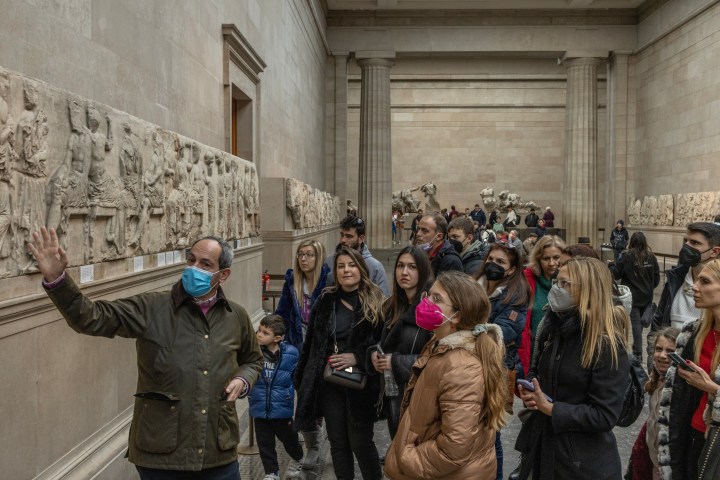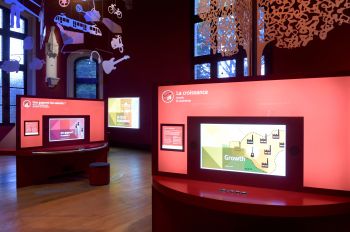
British museums weigh the cost of repatriating exhibits

The so-called “Elgin Marbles” are back in the news.
Talks between Greece and the UK have resumed over the future of the large pieces of marble frieze taken from the Parthenon in Athens by British peer Lord Elgin more than two centuries ago and displayed for many years in the British Museum in London.
Greece says the Marbles were stolen and they want them back. But the British Museum has so far refused to give up what it sees as one of its most precious exhibits.
The Marbles aren’t the only contested artifacts in British museums. Dozens of institutions across the UK are reported to be considering plans to repatriate some of their objects, typically items “acquired” during the period of the British Empire. Some curators have started the process, which could prove costly.
Late last year, Horniman Museum in Forest Hill, South London, transferred the titles to 72 ancient objects, including a series of plaques called Benin Bronzes, back to their country of origin, Nigeria.

“They came from the looting of Benin City by British forces in February 1897,” said the Horniman’s Director Nick Merriman. “Our trustees went through a process and concluded that they were acquired illegally and therefore that they should be returned.”

Six of the objects have already gone back, but Merriman concedes that returning all of them could be expensive for the museum which, he admits, is “strapped for cash.”
“If one is talking about professional art shipping then the costs, if borne by ourselves, could be significant,” he said. “But this would not stop us doing it. Absolutely not. The decision was made on moral grounds, irrespective of costs.”
The estimated cost of repatriating just 25 artifacts from another museum was $50,000. Nevertheless, India Divers of the Museums Association, which represents around 1,500 institutions across the country, said British museums must be prepared to pick up this tab.
“Repatriation is an important part of museum work. And so it’s right that money is spent on this as it’s spent on other parts of museum work,” she said. “So many museums in Britain were founded on the back of empire and transatlantic slavery, and so we see repatriation as a powerful cultural and symbolic act which recognizes past wrongs.”
But cultural commentator Tiffany Jenkins, a critic of repatriation, said that it betrays what should be the main purpose of a museum.
“It’s about knowledge, about understanding, about preservation, about audiences. And it’s not about righting the wrongs of history,” she said. “We should be thinking where can these objects be safest and where can they do the most good? Are objects going to be safe if they are returned to Nigeria, are they going to be seen by many people? I’m not convinced they are.”

Another critic of artifact repatriation is David Abulaffia, Emeritus Professor of Mediterranean History at Cambridge University and a member of a group of scholars called History Reclaimed, which tries to counter what it calls “modern-day ideologically driven distortions of the past.”
The group believes, for example, that too often the British Empire has been routinely and unjustly denigrated. Professor Abulaffia finds repatriation of artifacts “problematic” because it threatens to undermine what he argues is one of the highest aims of a great museum: to show the intermingling and interplay of many different cultures.
“In the British Museum you can walk from the Duveen gallery where the Parthenon marbles are displayed, to the Egyptian galleries and then upstairs to the Roman galleries.” he said. Three globally important cultures within walking distance.
If some great British museums surrender their non-British artifacts they will be severely depleted and impoverished, he said. “It does seem suicidal, frankly — can you imagine the British museum if all it has is knapped flints from pre-historic Wessex?”

Back at the Horniman Museum, director Nick Merriman dismisses all these fears as unfounded.
“We have about 300,000 objects and we’ve transferred the title of 72 of them,” he said. “So it’s unlikely that our collection is going to be significantly depleted. The returns that we anticipate are a tiny drop in the ocean. And I cannot envisage a situation where any British museum would return all its holdings from colonial times. But if something is stolen, it’s stolen and should be returned on moral grounds.”
There’s a lot happening in the world. Through it all, Marketplace is here for you.
You rely on Marketplace to break down the world’s events and tell you how it affects you in a fact-based, approachable way. We rely on your financial support to keep making that possible.
Your donation today powers the independent journalism that you rely on. For just $5/month, you can help sustain Marketplace so we can keep reporting on the things that matter to you.

















